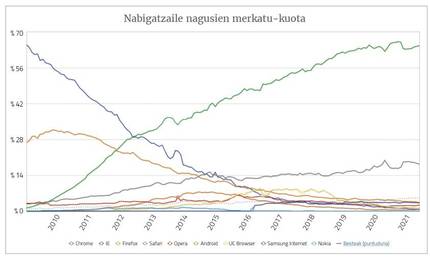The absolute superiority of Chrome
Over the course of 30 years of web history, the use of browsers has suffered huge ups and downs. At the end of the last century, Microsoft distributed free Internet Explorer with Windows and soon became almost the only one in the market. Later, in the mid-2000s, people started moving to Mozilla Firefox and turning around, and since then Explorer has been losing. By 2010, Firefox reached a quota of about 30%. But since then Explore and Firefox have been in decline, precisely because since then Apple's Safari browsers have been growing steadily and, above all, Google's Chrome. So today the Chrome browser has two-thirds of its market share and Safari is about 20%. Firefox and Microsoft's new Edge don't reach 4 percent each.
How has this change occurred in the last decade? The main reason is the move from web navigation from computers to mobile devices. In them predominates the Android system of Google, which has pre-installed Chrome (Google has also received fines for the pressure it exerts on phone manufacturers) and few install another browser on these devices. Also on desktop computers, driven by Explorer's bad reputation, the habit of installing Chrome spread.
Constant attempts to redirect the evolution of the web
As you can see, Chrome has an absolute hegemony in the browser market. And Google uses it to defend its private interests, often acting inadequately and with superiority.
Google has often made technical changes in the Chrome browser and the protocols and standards of the web (HTML, HTTP...) to its taste and without following the standards. He has bet on speeding up, improving or making web browsing more comfortable, but the real goal has been another: improving the functioning of your websites and services, making differences with other browsers and getting advantage. This bad practice was exploited for years by Internet Explorer and we suffered very well from those who were not users of it. Now we go the same.
In addition, Google’s influence on these protocols and standards for technical changes of interest has increased considerably in recent years. In fact, with regard to the so-called engine or engine component of browsers (which interprets the HTML code and executes the Javascript code), in recent years all those who are not Firefox have gone from being theirs to those of Chrome...
Permanent data accumulation
Google's main business is the sale of advertising space (on the browser, on Youtube, on Gmail...). A very important part of the overall spending gap in advertising is yours, on the one hand, because of the great use of these tools, and on the other, because of the great appreciation of the display of personalized and targeted advertising in the digital world and the good performance of Google. In order to do so, it is necessary to know the trends and tastes of the user, and to do so, using among others the Chrome browser, Google is monitoring and receiving at all times the activity of its users on the web, doing things that, among other things, are not anything civic and would at least be considered persecutions in a non-technological environment.
For example: The mushroom and Chrome theme in our Google account (three times for every boot, three!, asks Chrome to log in to Google's account until we finally do it and give it permission to spy on it forever). Another example: That Android phones do not share our location with applications (including Chrome) becoming increasingly difficult, as with the Google location knows better where we have been and what we like.
They also store user data for children, not only in the particular domestic use of children, but also in schools, although this is not possible. There are initiatives underway to report to the courts that Google keeps children's data through schools.
FLoC Trick
Now Google is trying to drive the new FLoC technology. The problem is that the war of attraction of advertising has been raised in recent years. The media and other websites that, unlike Google, are the responsibility of Google in obtaining advertising, can only obtain information from users through visits to their websites, and to combat it, invented the path of third-party cookies: they place cookies of monitoring services on websites that receive and collect information from many websites to profile the user. This practice of third-party cookies is contrary to the right to privacy and has recently acquired a very bad reputation. And it has announced then that Google will ban and block third party cookies from Chrome and replace FLoC and drive it. FLoC stands for Federated Learning of Cohorts or Federated Learning of Cohorts. Behind this inexplicable name is hidden that they will not keep the individual profile of each user, but will place us in a cohort or set of “Euskaldunes computer scientists who like comics”.
But of course, Google doesn't act to protect our privacy. The removal of third-party cookies has not been your initiative, no other option has been left for laws like GDPR that require the express acceptance of cookies after their removal by other browsers (Safari, Firefox, Brave, etc.). ). As you needed a substitute for cookies, it is a trap to keep doing the same by losing the laws of cookies. And because FLoC technology is its own and most of the world's web browsing is done from its browsers and devices, it gives them a great advantage in attracting advertising, as they can continue to profile users, unlike the media and other websites.
Fortunately, he immediately realizes the community of the Tranpaz website. All the other browsers have said that they will not implement it and that increasingly important websites (Duck Duck, WordPress, Amazon, GitHub…) are saying they will block it, so Chrome could not do it either. Faced with this type of opposition, Google has announced that FLoC will take longer and delay blocking third party cookies announced until 2023. It's what privacy of users matters...
With all the examples we have seen, it is clear that Google abuses Chrome’s dominance position to conduct practices in defense of its interests and against the web and users, or at least to try. In the case of FLoC, it seems that the initiative of the rest of the web agents will succeed in reversing, but it is clear that in the future Google will try again. Users are responsible for lowering Chrome’s user share as it was done with Explorer. But this time, if possible, let's bet on the only browser that doesn't have a profit company behind it. I mean, by Firefox; otherwise, the next dominator will do the same.








